All types of basil belong to the mint family, and people have been growing some kinds of basil for over 5,000 years. Most basil is used in cooking. You might know sweet basil from Italian dishes, but there are also many other kinds of basil used in Asian cooking.
What is basil?
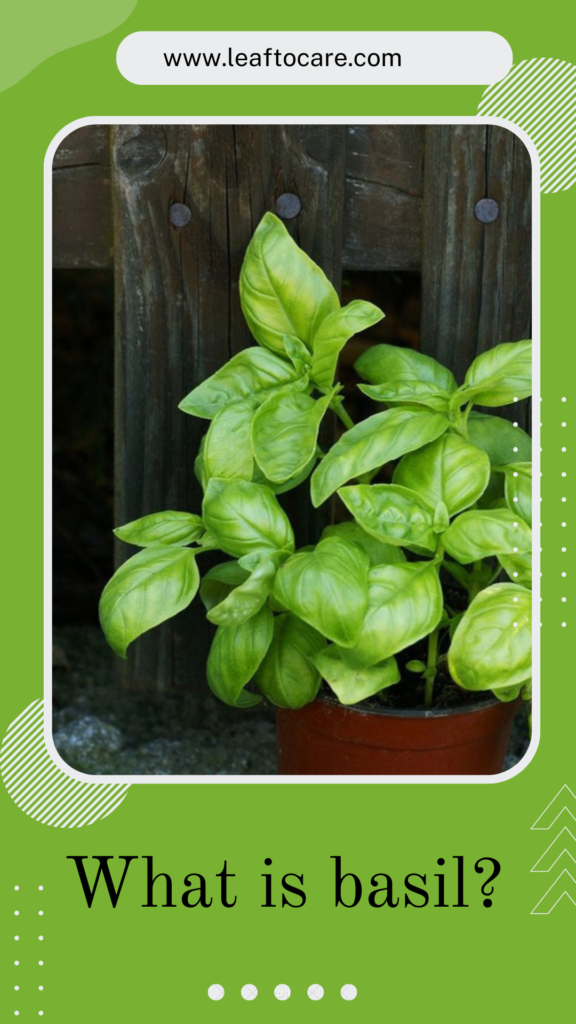
Basil, part of the (Lamiaceae) mint family, is commonly used in cooking, especially sweet basil. There are various types of basil, and you can find it fresh or dried. It’s easy to grow at home. Besides its culinary uses, basil has a history of medicinal use. Holy basil, distinct from sweet basil, is utilised in Tamil and Ayurvedic traditions, offering different tastes and reported health benefits.
Basil is thought to have originated in India, and now it’s grown in various countries across Asia and the Mediterranean, as well as in places like Hungary, Indonesia, Morocco, and the United States.
Types of basil leaves
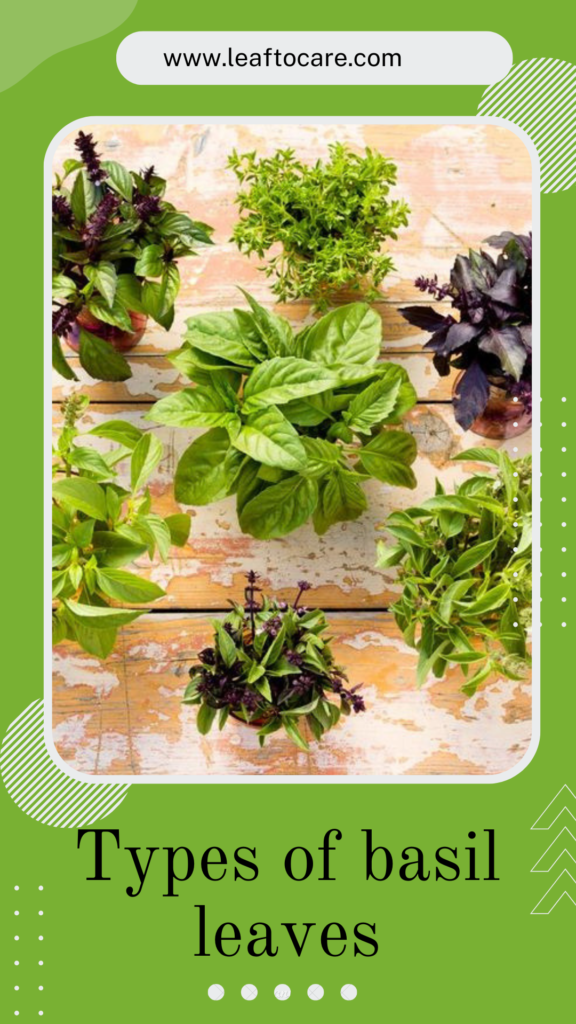
Here are some popular types of basil that you can find at seed companies and garden centres. If you’re a basil enthusiast, you might also want to try holy basil, also known as tulsi, which has a spicier flavour compared to sweet basil.
Genovese Basil (Ocimum basilicum ‘Genovese’)
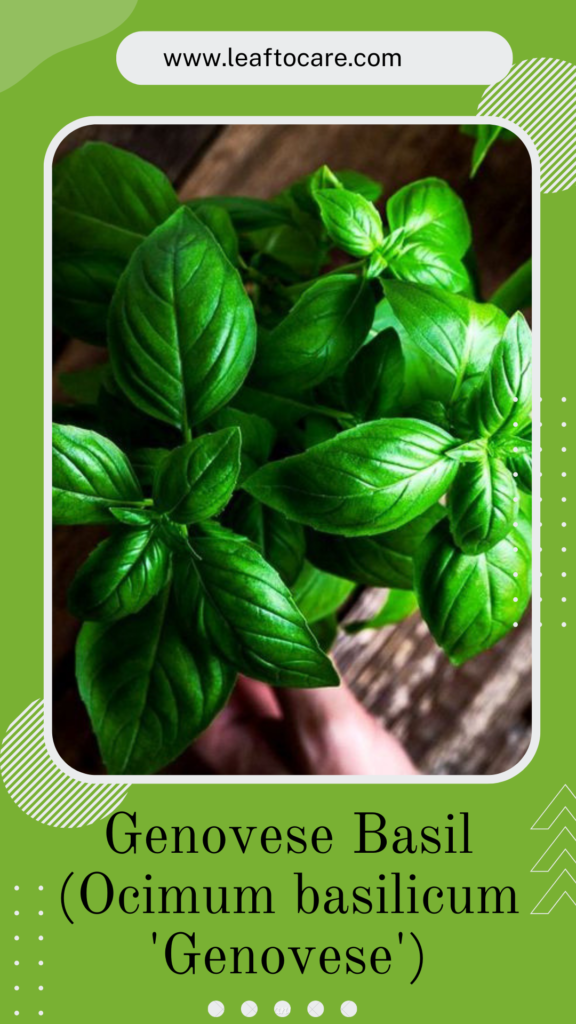
Genovese basil is indeed a type of sweet basil, maintaining the classic basil appearance and flavour. It’s a great choice for dishes like pesto and Italian cuisine. One distinguishing feature is its flatter and pointier leaves compared to traditional sweet basil. Additionally, Genovese basil has a more aromatic flavour, setting it apart from other varieties of sweet basil.
Best for: Pesto and pasta dishes, basil oil, basil sugar
- Native Area: Africa, Asia
- USDA Zones: 9 to 11
- Sun Exposure: Full sun to partial shade
- Height: 12 to 24 inches
Sweet Basil (Ocimum basilicum)
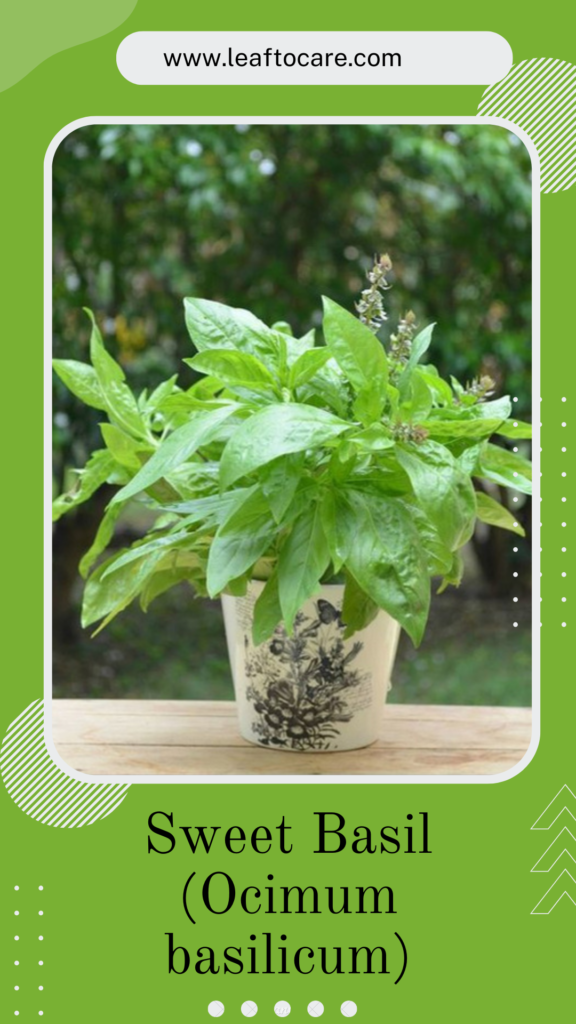
Sweet basil and Genovese basil are very alike, and people often use their names interchangeably. However, they are two different plants. Sweet basil has slightly lighter and more pointed leaves than Genovese basil. Its flavour is a bit sweeter and milder, with a subtle hint of anise or licorice.
- Native Area: Central Asia, Southeast Africa
- USDA Zones: 9 to 11
- Sun Exposure: Full sun to partial shade
- Height: 12 to 24 inches
Dark Opal Basil
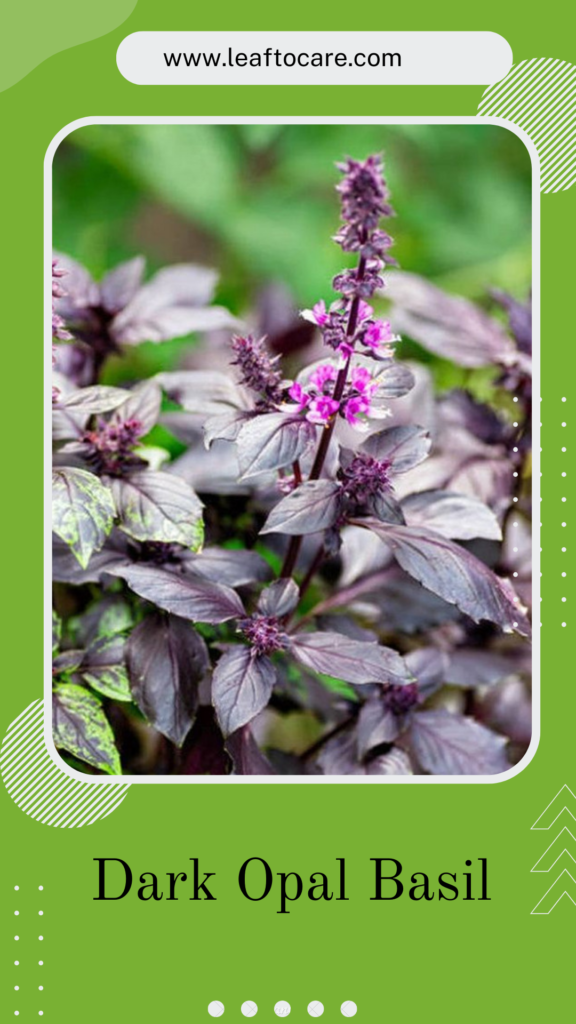
Dark Opal basil is a fragrant and spicy type of basil that can be used in the kitchen just like any other basil. What makes it stand out is its striking colour, making it a visually impressive addition to your herb garden and a vibrant addition to salads. It’s a bit smaller than some other basil varieties, typically staying under 20 inches in height.
- Native Area: Africa, Asia
- USDA Zones: 9 to 11
- Sun Exposure: Full sun to partial shade
- Height: 12 to 20 inches
Lemon Basil (Ocimum basilicum var. citriodorum)

If you like citrus, try growing lemon and lime basil. These heat-loving plants are great in pots or gardens, giving a strong citrus smell and taste. ‘Mrs. Burns’ Lemon’ is a common type, about 18 inches tall with bigger leaves than other citrus basils. Use them in drinks like teas, lemonade, or cocktails. Sprinkle in salads or cook with chicken and fish. You can also dry the leaves for nice-smelling sachets and winter teas.
- Native Area: Africa, Asia
- USDA Zones: 9 to 11
- Sun Exposure: Full sun to partial shade
- Height: 12 to 24 inches
Greek Basil (Ocimum basilicum var. minimum)

Greek basil, also called little leaf basil, is a small and compact plant. It looks cute and is useful in the kitchen. I like growing it in a pot near my kitchen for a steady supply. The tiny leaves have a strong basil flavour and smell, just like sweet or Genovese basil. You can use them in cooking. Some types to try are ‘Spicy Globe Basil,’ ‘Aristotle,’ ‘Pluto,’ and ‘Fino Verde.’
- Native Area: Africa, Asia
- USDA Zones: 9 to 11
- Sun Exposure: Full sun to partial shade
- Height: 6 to 8 inches
Lime Basil
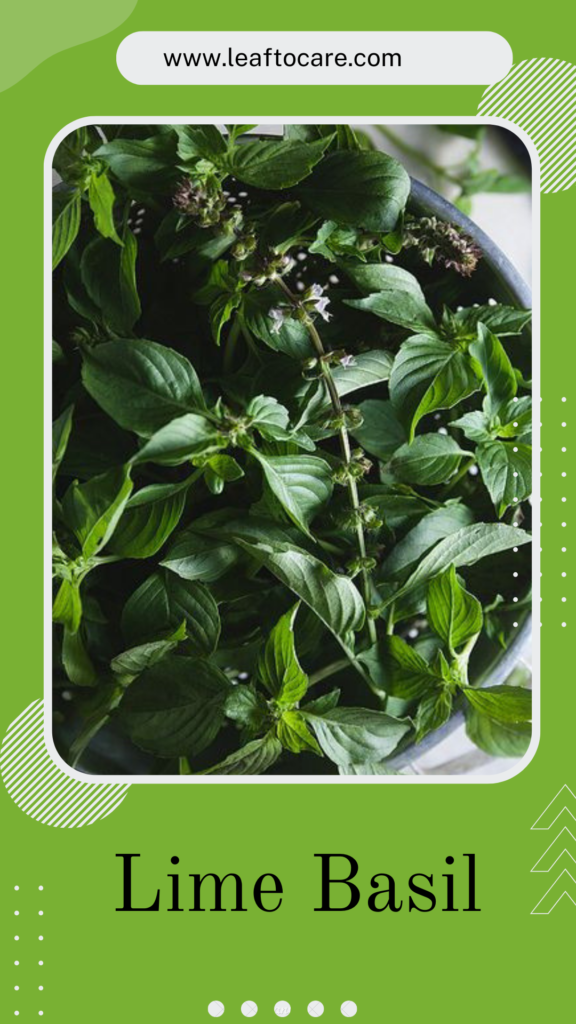
Lime basil resembles lemon basil in appearance but offers a distinct lime flavor. This makes it an excellent choice for enhancing fish and chicken recipes. You can also create a lime basil-infused syrup to add a flavorful touch to your tea or margarita. Its compact size makes it particularly suitable for small spaces.
- Native Area: Africa, India, China, Southeast Asia
- USDA Zones: 9 to 11
- Sun Exposure: Full sun
- Height: 15 to 36 inches
Thai Sweet Basil(Ocimum basilicum var. thyrsiflora)
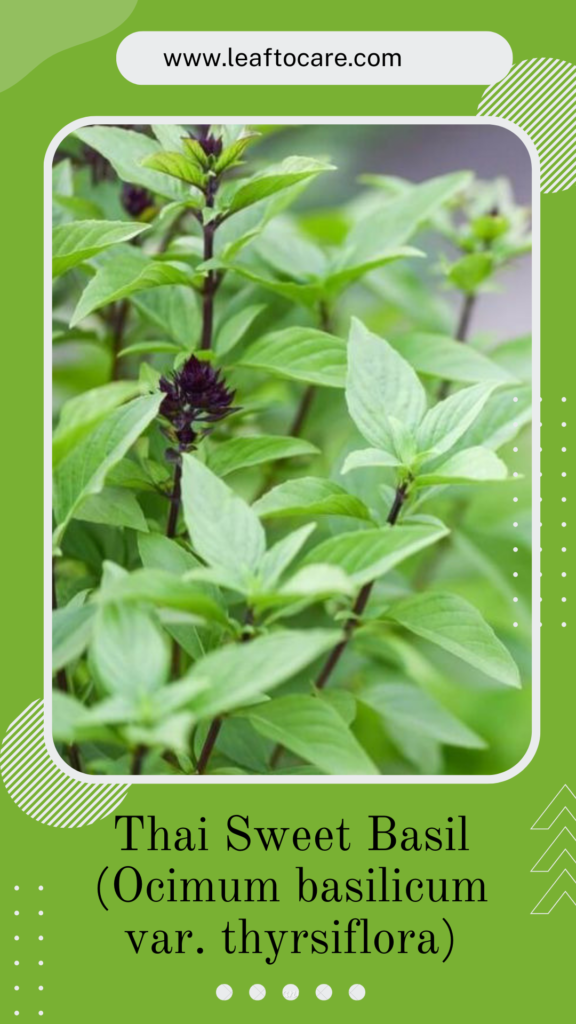
Thai sweet basil is occasionally referred to as licorice basil due to its aroma and taste reminiscent of anise and licorice. This sturdy and compact plant thrives in warm climates and can be grown from seeds or cuttings.
- Native Area: Africa, Asia
- USDA Zones: 9 to 11
- Sun Exposure: Full sun to partial shade
- Height: 12 to 24 inches
Holy Basil
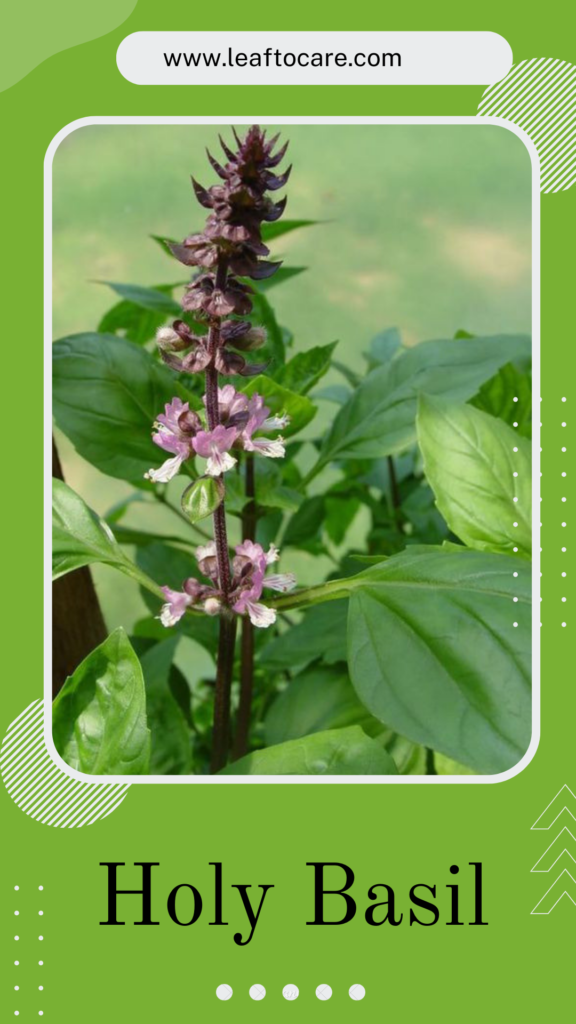
Holy Basil, also known as tulsi (pronounced tu-la-si), is a significant herb in Indian cuisines, especially in dishes like curries. Considered sacred in Hinduism, it holds both medicinal and religious importance. Holy basil is used to address stomach issues, enhance blood circulation, and is employed in the production of essential oils and herbal tea.
This basil species is highly aromatic, featuring a spicy and sweet musky scent. Its stems are hairy, and the leaves come in shades of green and purple.
- Native Area: India, Asia
- USDA Zones: 9 to 11
- Sun Exposure: Full sun to partial shade
- Height: 12 to 24 inches
Christmas Basil(Ocimum basilicum ‘Christmas’)
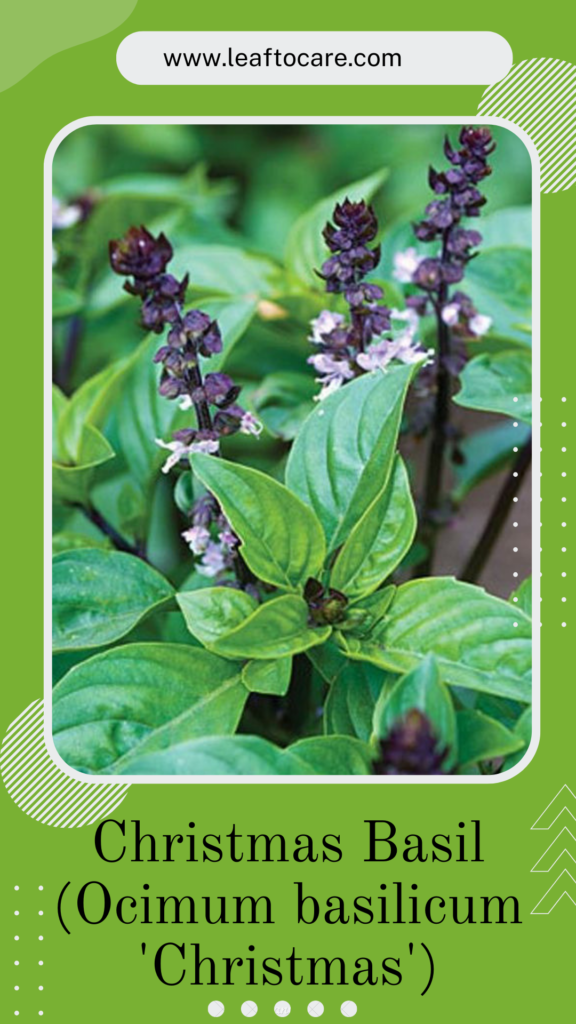
Christmas basil, with its fruity flavour, can bring a delightful twist to numerous dishes and drinks. Add it to salads for an extra burst of flavour that might leave you wondering how you ever managed without it. Additionally, its tall and attractive purple flowers make it a visually pleasing addition to its overall appeal.
- Native Area: Africa, Asia
- USDA Zones: 9 to 11
- Sun Exposure: Full sun to partial shade
- Height: 12 to 18 inches
Cardinal Basil (Ocimum basilicum ‘Cardinal’)
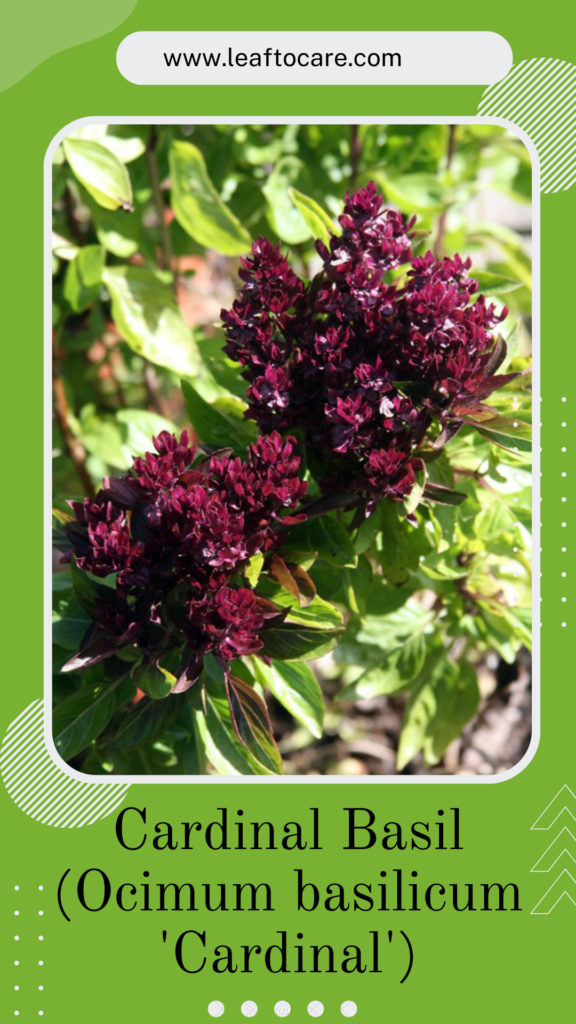
Cardinal basil, a cultivar developed in Israel, boasts showy flowers that make a dramatic statement in outdoor herb gardens. With a strong scent, it is frequently employed for adding flavour to oils and herb vinegar.
- Native Area: Israel
- USDA Zones: 9 to 11
- Sun Exposure: Full sun to partial shade
- Height: 24 to 30 inches
Globe Basil (Ocimum basilicum ‘Pistou’)
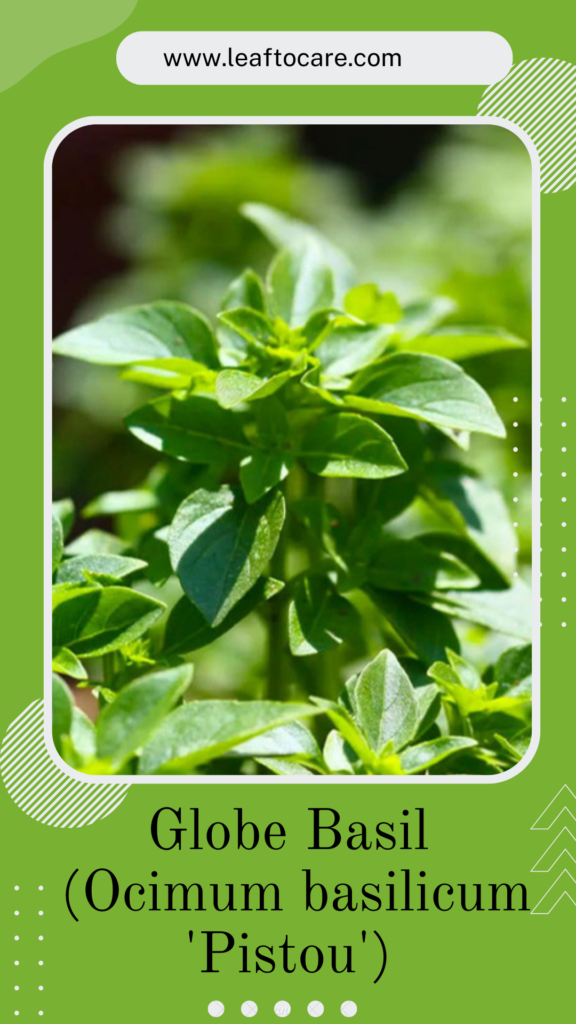
This plant is known by names like pistou basil, spicy bush basil, or boxwood basil. It’s a small sweet basil, probably originating from India and Asia. The tiny leaves form a cute little round shape, perfect for garnish or fresh use in salads and dishes.
- Native Area: India, Asia
- USDA Zones: 9 to 11
- Sun Exposure: Full sun to partial shade
- Height: 6 to 10 inches
French Basil (Ocimum basilicum ‘Marseilles’)
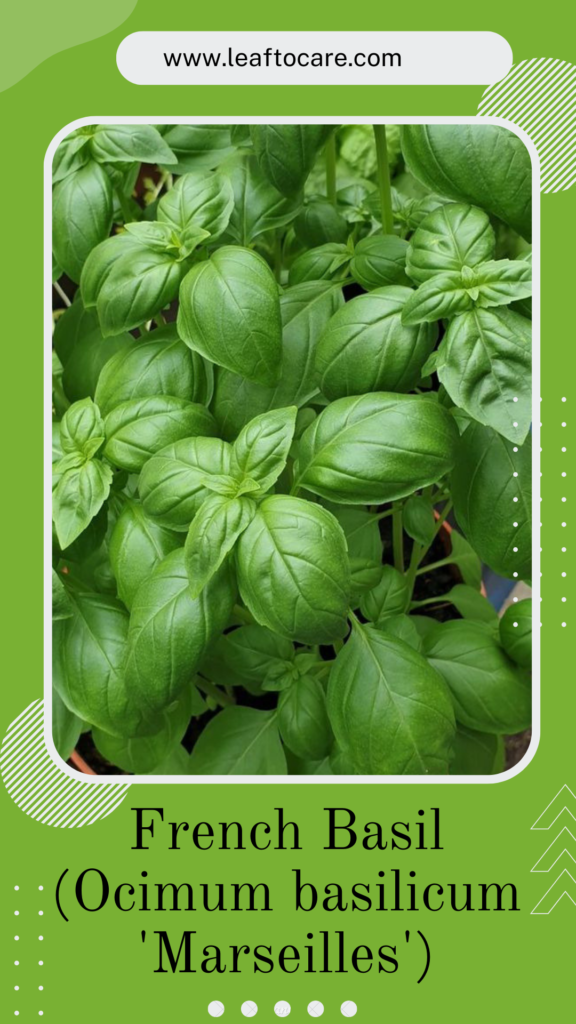
French basil, also known as Marseilles basil, is an heirloom globe basil with a compact plant featuring slightly larger leaves compared to other globe basil varieties. It boasts a strong and delightful fragrance. In French cuisine, it’s commonly used to make pistou, a sauce similar to Italian pesto.
- Native Area: India, Asia
- USDA Zones: 9 to 11
- Sun Exposure: Full sun to partial shade
- Height: 8 to 10 inches
Summary of 11 Types of Basil
- Here’s a recap of the delicious dozen basil varieties that we took a look at.
| Number | Basil | Uses |
| 1 | Dark Opal Basil | Used in Mediterranean cuisine for its sweet and earthy flavour |
| 2 | Lemon Basil | Nutrient-rich variety that can help strengthen bones, boost the immune system, and improve eye health |
| 3 | Lime Basil | Used in Thai cuisine, poultry, fish, sauces, fruit salad, and iced tea |
| 4 | Christmas Basil | Wonderful accent to sauces, soups, and meat dishes |
| 5 | Greek Basil | Excellent complement to a salad due to the size of its leaves |
| 6 | Cinnamon Basil | Often used in Asian cooking, and great in a fruit salad or as a garnish in the summer |
| 7 | Globe Basil | Ideal for garnishes and in salads |
| 9 | Holy Basil | Used in Indian cuisine due to its spicy flavour and is a popular herbal tea |
| 10 | Genovese Basil | Most extensively used and farmed basil for cooking |
| 11 | Sweet Basil | Widely used in cooking, especially for Mediterranean, and particularly Italian, dishes |
Conclusion
In conclusion, basil comes in various types, each with its own flavour and look. From the commonly used sweet basil to unique varieties like Genovese, Thai sweet, and Greek basil, there’s a lot of diversity. Some, like lime basil, have citrusy notes, while Christmas basil brings a fruity twist. Cardinal basil is not just tasty but also adds a pop of colour. There are even special kinds like holy basil with cultural importance. So, whether you’re cooking, garnishing, or enjoying the scent, basil offers a variety of choices to suit different tastes and needs.
